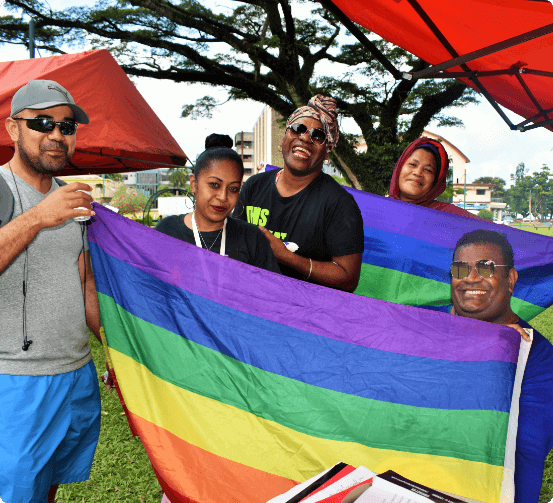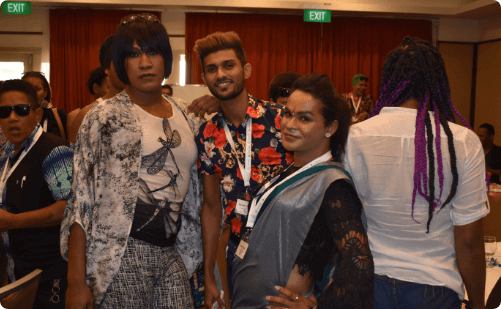- Accessibility:
- Text Size
Sexual Orientation & Gender Identity
- Home
- Sexual Orientation & Gender Identity
The Human Rights and Anti-Discrimination Commission (HRADC) with the support of the Asia Pacific Forum of National Human Rights Institutions (APF) convened a two-day national consultation on 26-27 July 2018 in Suva to identify human rights challenges faced by the lesbian, gay, bisexual, transgender, queer and intersex (LGBTQI) communities living in Fiji.
The national consultation was attended by 70 participants belonging to the LGBTQI communities from around Fiji including maritime zones and remote areas, where they had an opportunity to discuss key intersectional challenges, priority issues for different LGBTQI identities. The consultation saw the launch of a process to develop a national plan of action in collaboration with the HRADC to address the identified challenges. The platform was integral in identifying the structural causes of violence whether it be in the intimacies of our homes and/or the public sphere. This initiative is also consistent with the recommendations made by the UN High Commissioner for Human Rights on his recent visit to Fiji.
The national consultation was attended by 70 participants belonging to the LGBTQI communities from around Fiji including maritime zones and remote areas, where they had an opportunity to discuss key intersectional challenges, priority issues for different LGBTQI identities. The consultation saw the launch of a process to develop a national plan of action in collaboration with the HRADC to address the identified challenges. The platform was integral in identifying the structural causes of violence whether it be in the intimacies of our homes and/or the public sphere. This initiative is also consistent with the recommendations made by the UN High Commissioner for Human Rights on his recent visit to Fiji.

The key challenges highlighted at the consultation included discrimination, vilification and harassment of LGBTQI persons simply because of their sexual orientation, gender identity or expression and or sex characteristics (SOGIESC). Violence, condemnation and discrimination by family and the public, allegations of unfair treatment by law enforcement agencies, discrimination faced when accessing health services, discrimination at workplace, physical and emotional abuse of sex workers were some key issues highlighted by the participants. Sex workers also claimed their children were discriminated at school once they were identified as children of sex workers. Concerns were also raised over a recent incident, which claimed the life of a young LGBTQI person in Suva and whether it was a hate crime.
This was the first national LGBTQI consultation since the establishment of the HRADC.
Participants were briefed on the Fijian Constitution given that Fiji enjoys a robust and a progressive Bill of Rights with the inclusion of sexual orientation, gender identity and expression as prohibited grounds of discrimination. Many participants also had an opportunity to learn about the human rights issues that intersex people experience, because they are born with sex characteristics that do not fit typical ideas of male or female bodies.
This was the first national LGBTQI consultation since the establishment of the HRADC.
Participants were briefed on the Fijian Constitution given that Fiji enjoys a robust and a progressive Bill of Rights with the inclusion of sexual orientation, gender identity and expression as prohibited grounds of discrimination. Many participants also had an opportunity to learn about the human rights issues that intersex people experience, because they are born with sex characteristics that do not fit typical ideas of male or female bodies.
| SOGIESC Groups | NO | Percentage |
|---|---|---|
| Lesbians | 8 | 12% |
| Bisexual women | 4 | 6% |
| Gay and queer men | 15 | 22% |
| Bisexual women | 3 | 4% |
| Trans women and vakasalewalewa | 26 | 38% |
| Trans masculine people and brastos | 11 | 16% |
| Chose not to disclose | 1 | 1% |
| Total | 68 | 100% |

There were some participants who came as individuals as they were not members of any of the LGBTQI groups. Participants were from all walks of life and background which included: medical professionals, teachers, entrepreneurs, housewives, farmers, casual workers, media persons, sex workers, students and social activists.
The HRADC was successful in reaching out to these SOGIESC groups and individuals. The anticipated number of participants was around 60 but a total of 68 persons attended the two-day consultation.
The HRADC was successful in reaching out to these SOGIESC groups and individuals. The anticipated number of participants was around 60 but a total of 68 persons attended the two-day consultation.
Participants’ expectations from the national consultation were:
- Learn from each other’s experiences and share knowledge
- Safe space to share and collaborate
- Working together to have consensus/agreement to build solidarity among the LGBTQI community at a national level
- Opportunity to come together and to “own it and participate” in the development of a national plan of action
- Improve on personal growth
- Raise issues and be heard by HRADC, law enforcement agencies, healthcare providers and other stakeholders
- Learning about human rights and the complaints mechanism system
- Need to find purpose instead of just “streamlining, restructuring the process of achieving a national plan of action as this could help the next generation of LGBTQI persons live a better life, free from discrimination
- Learn more about professional standards
- Hopeful that the discussion will translate in some positive changes for the LGBTQI community
- Gain more and refresh current knowledge and understanding of the rights of a LGBTQI person
- Understanding the laws that a LGBTQI person needs to abide by
- Use the platform to share and gain more knowledge
- Great opportunity to learn from diverse experiences, lessons and knowledge
- More such forums to be held to keep the lGBTQI community informed of any review in the laws affecting them
- HRADC to continue to provide the support and guidance to the LGBTQI community living in Fiji

